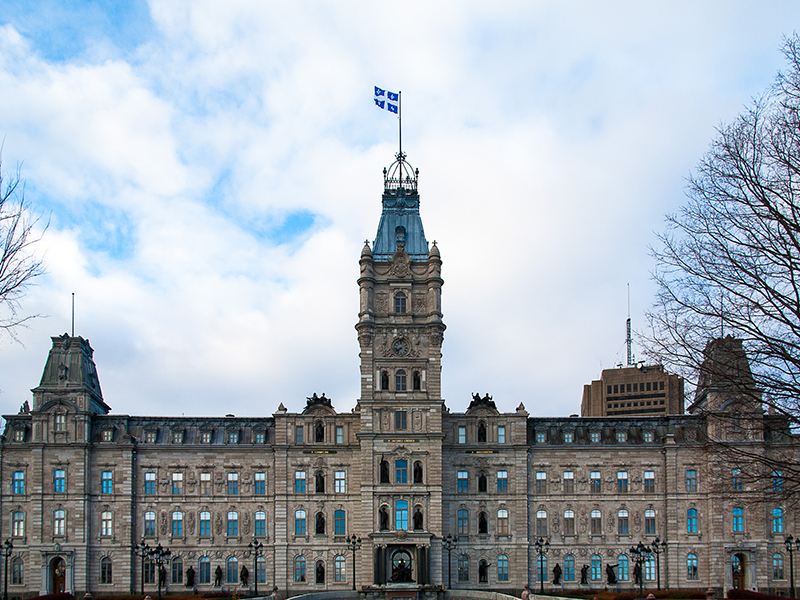Herbert Marx’s political career was as paradoxical as it was unlikely. No one was more surprised than he to find himself in the midst of Quebec’s anguished language debate and constitutional wrangling with Ottawa.
It has been 30 years since the then-cabinet minister’s dramatic resignation from the national assembly, after his Liberal government used the notwithstanding clause to override a Supreme Court decision that the province’s French-only signage law was unconstitutional.
At 86, Marx has published a memoir called My Story (a well as a French version called Mon Histoire) that offers tantalizing details about what was going on behind the scenes in those tumultuous years following the defeat of sovereignty in the first referendum of 1980.
That Marx took such a principled stand – along with two other anglophone MNAs – might not seem surprising, given that he represented D’Arcy McGee, a riding that had an overwhelming Jewish and English-speaking majority. His electors were fervently opposed to Bill 101 – the Charter of the French Language brought in by the previous Parti Québécois government – and deeply disappointed that the Liberals were taking such a hard line in promoting French at the expense of English.
In the months leading up to that fateful decision, Marx, who had been serving as justice minister, recounts that he was under fire from both sides. Francophones, even in his own caucus, thought he was more interested in defending the interests of les anglais than in toeing the party line, while anglophones were furious with him for prosecuting business owners who posted signs that were not unilingually French.
Marx was high profile, a seeker and receiver of media coverage on, not only language, but social and reformist issues he believed in, as well, notably conjugal violence and the modernization of the Civil Code. Detractors called him a “mangeur de micro.”
READ: MONTREAL HOLOCAUST MUSEUM PLANNING EXPANSION IN NEW LOCATION
The son of Latvian immigrants who grew up in the old Jewish district, Marx never thought he would get a university degree, let alone a law degree from a French university. His French was far from perfect when he entered the Université de Montréal (UdeM) to study English literature, after flunking out of McGill.
After a youth spent in poolrooms and then hitchhiking around the United States, he managed to get a belated high school diploma.
Restless working in his brother-in-law’s light bulb business, the 32-year-old Marx hit upon the idea of studying law. He found his vocation and excelled at it. He went on to Harvard law school and worked as a UdeM law professor for 10 years.
He was interested in civil liberties, and particularly linguistic minority rights in Canada, and soon gained a reputation as an expert in constitutional law.
It was propitious: with the first election of the PQ in 1976, Canada was panicking over its future.
Marx caught the eye of Claude Ryan, the intellectually and morally rigorous former editor of Le Devoir, who had just become Liberal leader. From Marx’s description, it seems Ryan was impressed by the law professor’s integration into the French Quebec milieu.

D’Arcy McGee MNA Victor Goldbloom resigned soon after and Ryan persuaded Marx to run in the 1979 byelection. The Jewish community establishment vetted Marx, as he would, in effect, be its voice in Quebec City.
Ryan’s leadership was short-lived. After the Liberals failed to defeat the René Lévesque-led PQ in 1981, the wily and calculating Robert Bourassa took the helm of Liberal party. Gradually, Marx gained his confidence.
Marx’s admiration for Ryan, with whom he had a close friendship, never diminished. Surprisingly, he remembers Bourassa with affection and esteem, despite their tumultuous relationship.
Bourassa had taken the justice portfolio away from Marx some months before his December 1988 resignation, leaving him with the less prestigious public security file, following an uproar over the government subsidizing the legal fees of Alliance Quebec, the English rights lobby that was fighting Bill 101.
Marx, who remained the affable everyman, despite his academic credentials, admits that he knew his political career was nearing its end, one way or the other.
Despite the confidence Ryan and Bourassa placed in him, Marx feels he was regarded as an outsider – an anglophone and a Jew.

He describes how he encountered insinuations – and sometimes outright challenges – about his identity and loyalty. It surprised him because, he says, in his 10 years teaching at UdeM, he felt fully accepted. He says he always felt “100 per cent Québécois.”
An interesting passage is Marx’s recollection of the events of 1983, when the CEQ, a teachers’ union headed by Yvon Charbonneau, was distributing anti-Israel material in Quebec schools that spoke of the state’s “genocidal war” against the Palestinians. Since 1976, Charbonneau, a separatist, had been a vociferous denouncer of Israel.
Marx called him an “enemy of the Jewish people.” PQ Education Minister Camille Laurin defended the school boards’ authority and took the opportunity to attack the controversial Israeli minister Ariel Sharon’s visit to Montreal at that same time.
More disconcerting to Marx was that he got no support from his own party, from either interim leader Gérard D. Lévesque, or his friend and mentor Ryan, who was the education critic at the time.
In retrospect, Marx – who was appointed a Superior Court judge after leaving politics – is charitable toward his former leader.
“What choice did Bourassa have? Neither the English nor the French could appreciate the concerns of ‘the other.’ French Canada lives in a corner of North America, with a population of eight million, where the dominant language of the other 350 million inhabitants … is English. How does a minority culture and language protect itself?” Marx writes.
In 2018, that question has still not been satisfactorily answered.
